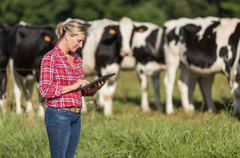Women in Farming
“Women of the world have always brought us our food.”
- Franklin Delano Roosevelt, September, 1937
President Roosevelt repeated this quote in 1943, when thousands of Women took to the fields to relieve male farmers gone off to foreign battlefields to end fascism.

One place female farmers were featured in the 1940s was in Successful Farming magazine. Darlene Graf, 17, was on the cover in September 1943. She helped run her family's Nebraska farm when the hired man left for a Defense job.
In September 2018, Successful Farming caught up with then 92-year-old Darlene Harrington at her home in Tulsa, Oklahoma.
She said farming was an easy fit for her during the war years. She had had a driver's permit since age 14 to truck grain to the elevator in town, drove a tractor on the farm, and helped with the wheat harvest. She had grown up on the farm during the Depression, watching her mother raise chickens and grow a large garden to feed the family, selling eggs and dressed fryer to ladies in town to make ends meet.

A Proud History of Women in Ag
The Bureau of Agricultural Economics reported more than 2 million men left farm jobs between April 1940 and July 1942, as World War II had them abandoning the farm for military service and wartime industries.
By war's end, that number had climbed to 6 million, and U.S. food production had increased 32% over prewar levels.
Women picked up the slack. Women are not new to agriculture.
The tale of women's contribution to ag through time is documented by the Female Farmer Project, created by Audra Mulkern.
She says the idea came to her in the midst of a revelation at the farmers market in her local farming community on Puget Sound.
"I was people-watching, and I realized that there were women behind every single table," she says. "I wondered where the men were, then I wondered what made me think farmers should be men."
She began to explore the rise of women in agriculture, and to ask, "Who is growing my food?"
Before long, she self-published a book of her original photos, along with farmer essays. That expanded into stories, essays, a podcast, and a documentary film Women's Work: The Untold Story of America's Female Farmers.
Mulkern uses investigative reporting to delve into topics such as the mental health crisis and community leadership. "I'm looking at a lot of things through the gender lens: farming, leadership, tracking female farmers running for office," she says. "Yes, there are women farming. That's established. Now let's talk about them being at the table."

FarmHer
Few efforts have done as much as Marji Guyler-Alaniz's FarmHer to change the image of women on the farm.
"Women have always been an important part of ag," says Guyler-Alaniz. "But you haven't always seen that." She wants other women, particularly young women, to see themselves in her images and see their possibilities.
When Guyler-Alaniz set out on her first photo shoot in April 2013, she wanted to photograph women farmers in their native habitat. What the lens found were women in touch with their inner selves, their land, their livestock, their lifestyle. These were empowered women, with the potential to empower others.
That sense of empowerment carried over to an educational movement that includes images, merchandise, public appearances and a series of GROW seminars focused in young women age 15-23.
An active online community, FarmHer has 47,000 followers on Facebook and 23,000 on Instagram, with another 7,000 on Twitter.
There is also a television show on RFD-TV, a radio show, a podcast, and a regular monthly column in Successful Farming magazine.
"Women bring a certain beauty to agriculture that we don't always see," says Guyler-Alaniz.
Among other things, FarmHer encourages women in ag to understand their motives before setting more goals. Guyler-Alaniz says she is motivated the potential good the movement can bring, in helping the consumer understand the origins of their food, helping the public see women farmers realistically, and helping women in ag gain confidence in themselves.
FarmHer is there for women of all ages – those just starting out, those returning to the farm, and those still, after many years, facing the day-to-day challenges of life on the farm.
Guyler-Alaniz took a leap in leaving her career behind to follow FarmHer's path. She tells women facing similar circumstances to dig deep for the courage to go for it.
Then, find the tribe that makes you feel courageeous. Guyler-Alaniz says by tapping her courage and her support system, she was able to gain more confidence in her abilities. She hopes that insight will help others move mountains as they make their way in the world of agriculture.

Today
Advancements in technology and mechanization have made farm work less physical, and have enticed more women to engage in ag careers. Other women have been there all along, just not in the limelight.
According to the USDA's 2017 Census of Agriculture, just over 36% of American ag producers are women, an increase of nearly 5%.
Just like any other farmers, these women talk about the struggles of commodity prices, express their great love for the land and concern about regulation, and rave about the generations that farmed and ranched the same ground before them – all from behind the wheel of their pickups.
What makes them different from their male counterparts is they never assumed they'd be the ones inheriting the farm.
Most content provided by Successful Farming Magazine
https://www.agriculture.com/family/women-in-agriculture/the-importance-of-women-in-ag